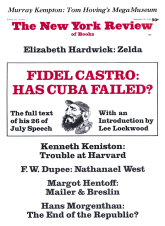In response to:
Closing the Oppenheimer Case from the July 2, 1970 issue
To the Editors:
H. Stuart Hughes in his excellent article, “Closing the Oppenheimer Case” (NYR, July 2), finds it puzzling that Oppenheimer’s “cock and bull story” about Chevalier made things worse for his friend by specifying three approaches among other fictitious details. Certainly the lie was not clever, but an honest man is not obligated to tell clever lies. The record shows that Oppenheimer’s references to other contacts were very vague:
I have known of two or three cases, and I think two of the men were with me at Los Alamos…. There may have been more than one person involved. I don’t know.
It was Colonel Pash who said: “He made about at least three contacts that we know of?” And Oppenheimer answered: “Well, I think that’s right, yes.” The vague references to other contacts had the function of distracting security officers from the unpleasant fact that the approach had been made to Oppenheimer himself; as he ruefully admitted, he was not only protecting Chevalier but his own reputation.
What is more puzzling, however, is that the reference to three contacts still remains in the security officers’ reports in late 1943 of Oppenheimer’s recent disclosure that he had told earlier “a cock and bull story.” This fact gave General Nichols a pretext for concluding in his recommendations to the AEC that the “cock and bull story” was true, while the story given to the security board in 1954 was false. This damaging interpretation made Oppenheimer out to be a liar at the time his credibility was being determined for clearance. As I have argued elsewhere (“The Oppenheimer Case: Melodrama, Tragedy, and Irony,” Virginia Quarterly Review, 40, Spring, 1964, pp. 273-4):
There are simpler and better explanations: perhaps the security officers could not really believe that all the embroidery was fanciful; perhaps Oppenheimer had become confused about the details of the original evasive story. His distortion of the event was vague enough as he hastily improvised under the pressure of Colonel Pash’s questioning. Pash himself provided indirect support for Oppenheimer’s version by testifying that despite arduous investigation no other contacts had ever been established.
In any case Mr. Stern’s suggestion that the original story was true is not a friendly amendment to Oppenheimer’s account because then he would be lying in 1954 rather than in 1943 when the circumstances mitigated the act without damage to his case for clearance, as two of his judges understood. Even so, it is hard not to be reminded of Scott’s line: “Oh, what a tangled web we weave,/When first we practise to deceive!”
Cushing Strout
English and American Studies
Cornell University
Ithaca, N.Y.
This Issue
September 24, 1970



